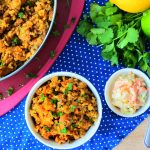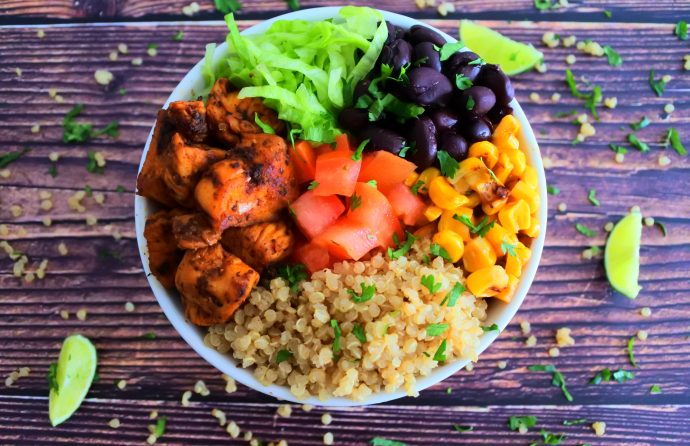
Hey guys! I’m so glad you’re here because I am so very excited to share today’s dish with you as it’s one that’s near and dear to my heart (and stomach!).
🥘 Pelau 🥘 It’s the unofficial national dish of Trinidad and Tobago. This one pot recipe serves as a testament to the harmony of the Caribbean’s multicultural society and is quite honestly an iconic rice-beans-and-meat dish that stands on par with other similar cultural versions such as pilafs (the Asian counterpart), pulao, pilau, or polow (the Indian/Persian counterpart), or even Spanish paellas. Trust me when I tell you that you have to give this one a try because you are not going to want to miss out!

Now while every household has their own special blend of seasoning and add-ins that makes this dish unique and trademarked to them, at its core, pelau is made by making a Caribbean stewed meat (this is what gives the dish a lot of its flavor and color) and then adding in the rice, beans, and veggies that will cook and simmer in coconut milk and the flavorful sauce from the stewed meat. This dish is rich, hearty, healthy, and perhaps my favorite one-pot comfort food.
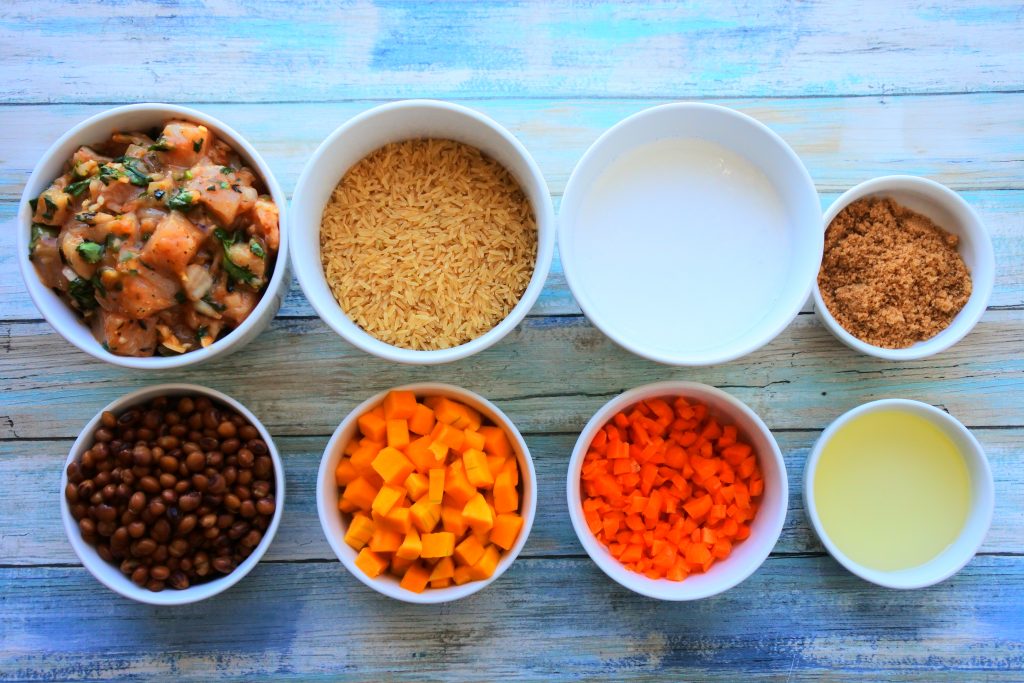
To make this we’re going to be using well seasoned chunks of chicken (beef or pork can also be used with fantastic results) that will stewed in oil and caramelized brown sugar (I’ve made a separate and more detailed post on how to season and stew the meat HERE) along with butternut squash, carrots, pigeon peas, parboiled brown rice, and coconut milk.
Now, I honestly wouldn’t recommend making pelau with regular (short grain) rice. The parboiled brown rice is honestly ideal as it tends to stand up so much better to being cooked for longer periods of time without losing its shape or form. Regular short grain rice tends to cook too quickly and will over absorb the liquids in the pot which will cause the dish to become mushy and porridge-like as the rice grains will essentially melt away 😬

After washing, cutting, seasoning the chicken and letting it marinate for at least an hour in an assortment of herbs and spices, we’ll brown the raw organic brown sugar in oil until it’s caramelized. When the edges of the now-molten sugar just begin to turn black (like in the second image above) we’ll add in the seasoned chicken, being careful to not allow the oil and sugar to splash. After turning to ensure all pieces are evenly coated we’ll allow it to sit undisturbed for two minutes before turning it again and allowing it to sit for another two minutes. This allows the color to set and the flavors to develop which is essential for our pelau base.
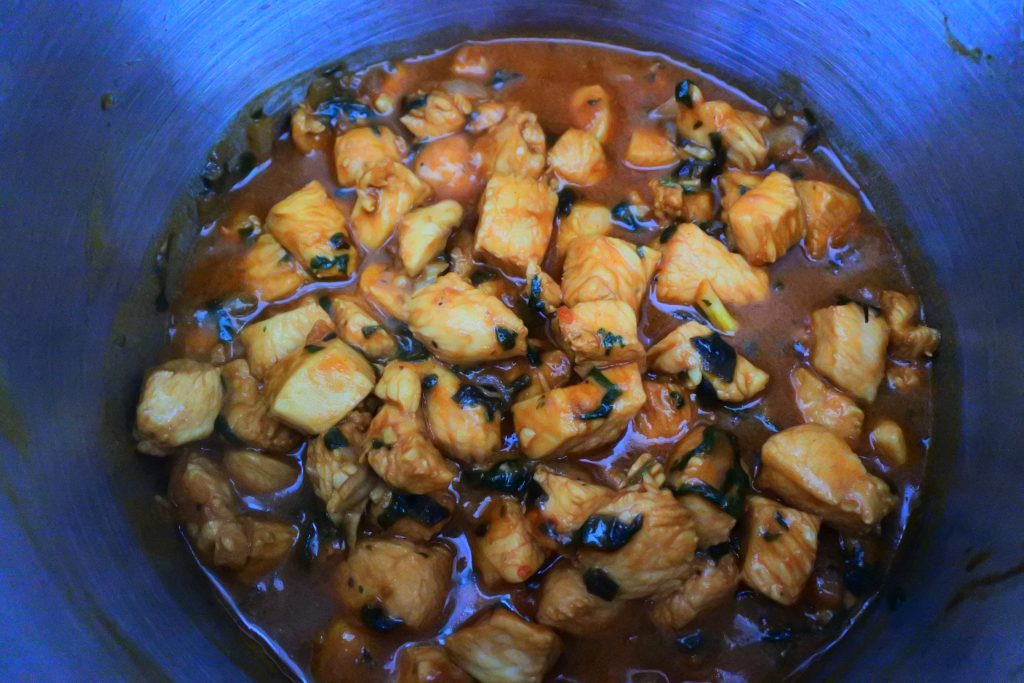
Next we’ll add some water (or chicken broth if preferred) to the chicken and allow it to simmer for fifteen minutes.
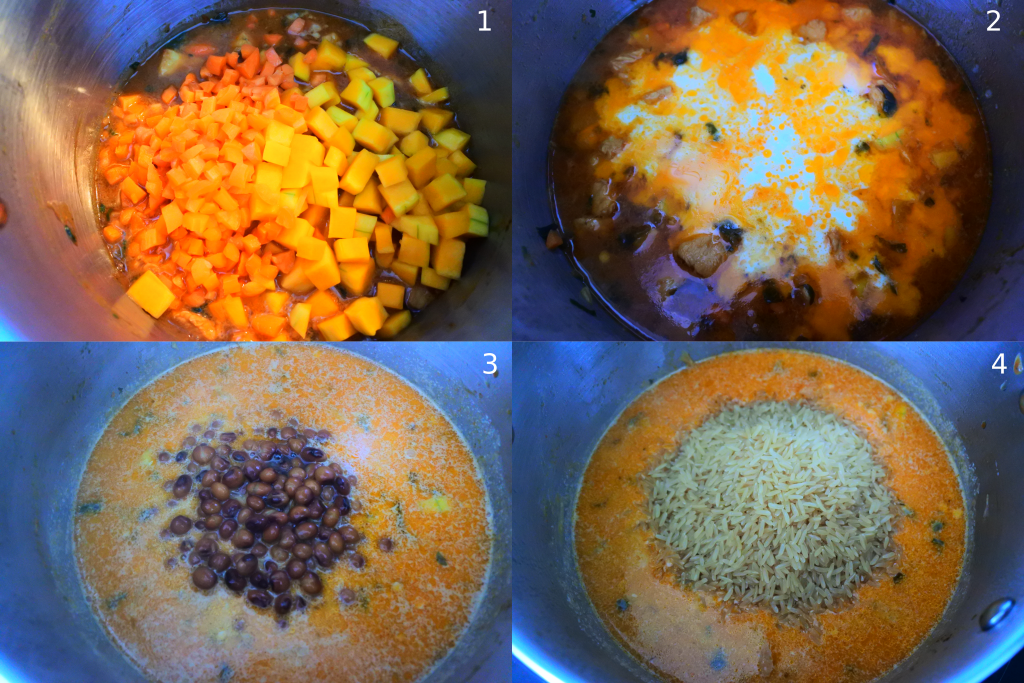
Once the chicken has simmered we’ll add in the carrots and squash, followed by the coconut milk and the peas, and finally the rice, allowing for a 2-3 minute interval between each.
Note that while we will rinse the granules of pigeon peas, we will not be washing the parboiled rice since it is already pre-washed and partially boiled (hence the name!).
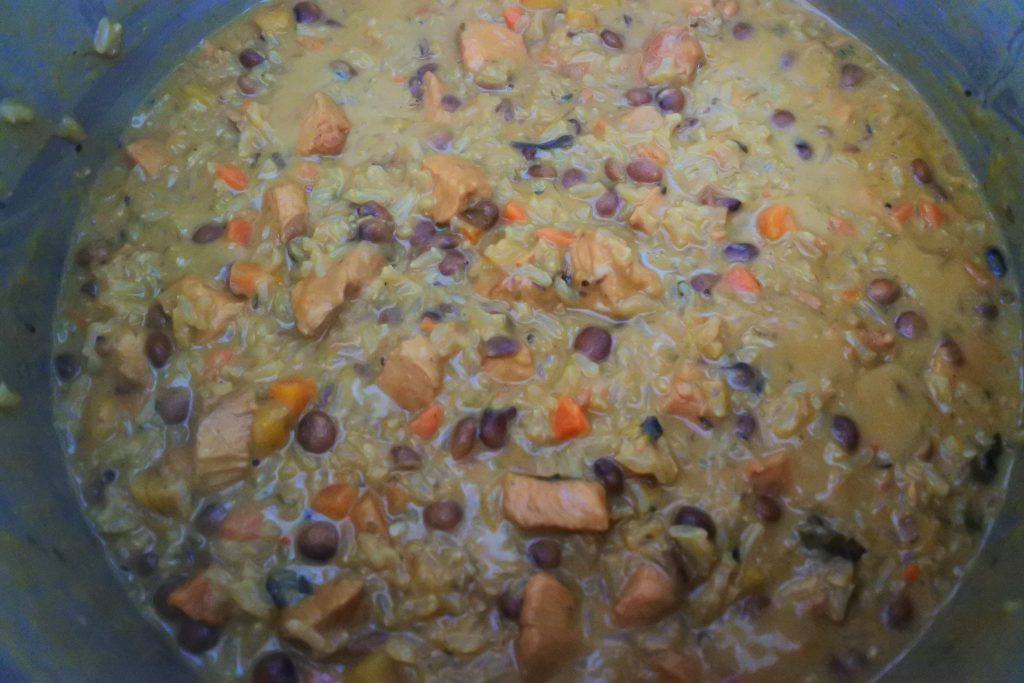
Once the rice is added and mixed in, we’ll cover our pot and allow our pelau to simmer on med-low heat until most of the liquid is absorbed by the rice and cooked off. Be sure to stir the pot and scrape the bottom every-so-often to ensure that the ingredients aren’t sticking and burning. If the rice isn’t yet cooked and the liquid level is low, add some more liquid and continue to simmer until it’s done. However, if the rice is cooked and there is still liquid in your pot, simply remove the cover and allow the extra liquid to slowly cook off.

The end result should look like the above (or drier). Ideally your pelau shouldn’t be too wet so you’ll want most of the liquid to be cooked off. Honestly the flavors in this dish gets better over time (do you ever notice that most one pot dishes always seem to taste better the next day??) so before serving I highly recommend that you let it rest for at least an hour and you’ll see that it will continue to dry out further as the rice rests and continues to absorb any remaining liquid, which is precisely the reason that parboiled is ideal.

Being widely enjoyed and adored by all, pelau often makes an iconic guest appearance at any and all Trinbagonian social events, particularly beach trips and river limes*! 😍
Though it’s honestly perfect on its own, you really can’t go wrong in pairing it with a side of Creamy Coleslaw and/or with a few refreshing slices of cucumber or a side salad!
* a “lime” refers to not just the citrus fruit but it is also the Trinbagonian lingo for a social gathering or group hang out!
Trinidadian Chicken Pelau
Ingredients
For the Stew Chicken base
- 2 lb boneless, skinless chicken breasts (cubed)
- 2 tbsp chives (finely chopped)
- 3 tbsp fresh cilantro (or 1 tbsp culantro aka chadon beni)
- 3 cloves garlic (grated)
- 1/2 medium onion (diced)
- 1 tbsp fresh basil (chopped)
- 1 tsp Dried Oregano
- 1 tsp fresh ginger (grated)
- 3 sprigs fine thyme
- 1 tsp Smoked Paprika
- 1 tsp Chipotle Powder
- 1 tsp cayenne pepper
- 2 tsp Himalayan salt
- 1 tsp ground black pepper
- 3 tbsp tomato sauce
- 2 tbsp soy sauce (gluten-free)
- 4 tbsp extra light olive oil
- 3 tbsp raw cane sugar
- 1-2 cups water or chicken broth (or chicken broth)
For the Pelau:
- 1 cup butternut squash (cubed)
- 1/2 cup carrots (diced)
- 13.5 oz coconut milk (1 tin)
- 15 oz pigeon peas (1 tin, strained and rinsed)
- 2 cups parboiled brown rice
- 1 cup water
- 1-2 tbsp salted butter (optional)
Instructions
- Season the chicken: Dice and season the chicken breast using the chives, cilantro, garlic, onion, basil, oregano, ginger, fine thyme (leaves only, discard the sticks), smoked paprika, chipotle powder, cayenne, salt, pepper, soy sauce and tomato sauce. Mix well to ensure all seasoning is evenly distributed. Cover, and marinate for at least an hour.
- Stew the chicken: In a heavy-bottom pot, add the oil and the sugar on high to medium-high heat. Allow the sugar to slowly melt and when it starts to spread, froth, and you can just see the edges and underside (through the froth) beginning to darken, lower the heat to medium-low and add in the chicken quickly (but carefully) and turn the pieces to ensure that all are evenly coated with the caramelized sugar.
- Once coated, allow the chicken to cook undisturbed (on med-low) for two to three minutes before turning and allowing the pieces to cook on the other side for another two to three minutes.
- Pour in enough water or broth to partially cover the chicken and cover your pot and allow the meat to simmer for 15 minutes.
- Make the pelau: Add in the carrots and squash and simmer for 2-3 minutes. Next, pour in the coconut milk and add the the washed and drained pigeon peas and simmer for another 2-3 minutes before finally adding in the parboiled rice and turning so that it is evenly distributed with the other ingredients.
- Bring the pot to a boil before reducing the heat and covering. Simmer for 25-30 minutes, stirring gently every so often and scraping the bottom of the pot to ensure that none of the ingredients stick and burn and everything cooks evenly. In the event that the rice is not fully cooked after 30 minutes, simply add more liquid (if needed) and continue to simmer for an additional 10 minutes.
- Once nearly all the liquid is reduced and the rice is fully cooked, turn off the heat and cover the pot and allow the ingredients to fully meld together. For added richness, you can add 1-2 tablespoons of salted butter.
- Serve your pelau with freshly sliced cucumbers, a side salad, or with a homemade coleslaw. Store any leftovers in an air tight container for up to one week in the refrigerator or four months in the freezer.
Notes
- You can use any meat of your choice including beef and pork or even bone in cuts of chicken if preferred.
- The granules of pigeon peas that come out of the can should be rinsed under cool tap water to remove the liquid it's been soaking in along with any excess sodium (salt) that is not needed.
- Pelau can be cooked to be either slightly wet or dry to the point where the rice has absorbed all liquids. It's up to you how you enjoy it and you can attain either by cooking off all liquids or by adding in a bit more liquid to keep it moist and almost creamy (like a risotto).
